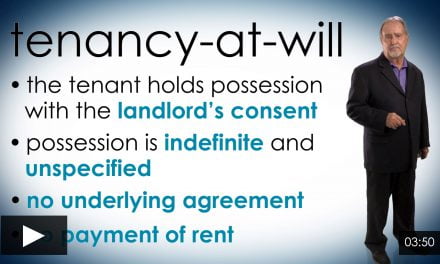Creative financing vs. creative chaos
To properly document the terms of seller carryback financing in a sale of real estate, one of two sets of forms is used:
- a note and trust deed, to evidence and secure the balance of the price remaining to be paid to the seller following the buyer’s down payment and a grant deed conveyance, whether or not the property is encumbered by an existing mortgage lien; or
- an all-inclusive note and trust deed (AITD), to evidence and secure the balance of the price remaining to be paid to the seller after the buyer makes a down payment and receives the seller’s grant deed when the property is encumbered by an existing mortgage lien.
All other forms used to document the terms of carryback financing offer not creative financing, but introduce creative chaos, both legal and financial. The economic function of all types of documentation for a carryback sale is the same — debt, interest, payment and security.
Seller financing consists solely of arranging the financing of real estate through the seller’s extension of credit, allowing the buyer to pay a portion of the sales price in the future — an installment sale. Arranging financing does not include the creation of alternative documentation, called masked security devices, to replace the note and trust deed.
Mistaken expectations with alternative documentation
Creating new forms as security devices by using documents designed to serve a purpose different from a trust deed is the primary cause of creative chaos and the resulting mistaken expectations.
Documents developed for otherwise legitimate business purposes are occasionally substituted for notes and trust deeds to set up a smoke screen in an attempt to avoid:
- an existing mortgage holder’s exercise of its due-on clause;
- reassessment for property tax purposes;
- income tax reporting of profits at the time of the sale; and
- the buyer’s right of reinstatement or redemption on a default on the debt.
The purpose of alternative documents is to corrupt the system set up to track conveyancing. All too often, the intended result is actually attained by the seller — without penalty.
One form of alternative documentation for a carryback sale includes the use of a land sales contract, sometimes improperly called a contract for deed.
A buyer’s full benefit of ownership lost
When a land sales contract is used, it becomes a substitute for the grant deed, note and trust deed. Thus, the new owner/buyer on taking occupancy does not become the vested owner of record. As part of the process under a land sales contract, the buyer often fails to exercise their full benefits of ownership, such as:
- interest (and possibly depreciation) deductions;
- the right to further encumber or otherwise use the equity in their property; and
- property tax homeowner/veteran exemptions.
Further, hiding the sale from the mortgage holder generally includes hiding it from everyone, including the:
- Internal Revenue Service (IRS);
- Franchise Tax Board (FTB);
- local property assessor and tax collector; and
- creditors.
Other disadvantages exist for buyers who use land sales contracts in lieu of a grant deed, note and trust deed. These negative results include the failure to record the documents used and the loss of the benefit extended to recorded transactions as well as the lack of title insurance.
At the very least, a carryback transaction which is intended to be unrecorded, unescrowed and uninsured needs to use proper documents — a grant deed, note and trust deed — to avoid compounding the failure to record and obtain a title insurance policy.
The evolution in use of the land sales contract
Land sales contracts were widely used from the late 1960s into the late 1970s as the preferred method for avoiding due-on enforcement by mortgage holders. [Tucker v. Lassen Savings and Loan Association (1974) 12 C3d 629; see RPI Form 168]
The financing arrangement is deceptively simple. Under a land sales contract, a buyer and seller enter into an agreement for the sale of property on credit terms. The buyer takes possession of the property and makes payments as stated in the agreement. The transaction lacks a formal escrow, title insurance, and the numerous mandated disclosures of property conditions and statutory seller financing disclosures. [See RPI Form 300-1]
Title does not formally pass to the buyer by grant deed until the buyer pays the seller in full. On entering into a land sales contract, an equitable conversion of ownership occurs altering the seller’s vested title position to that of a lien on the buyer’s ownership interest in the property.
From that moment forward, the seller is only entitled to receive money and not a return of the property, except by foreclosure. Thus, the buyer becomes the equitable owner of the real estate with the right of redemption to pay all sums due the seller and get clear title. No right of reinstatement for delinquent payments exists for the buyer under a land sales contract. [Tucker, supra]
However, as straight forward as the land sales contract may sound, it has proven to be an extremely fragile financial and legal affair for all involved.
Land sales contracts reemerge with all their uncertainties
Land sales contracts are once again being resurrected in the off-record housing market. In its latest incarnation, investors who purchased homes in bulk and are now selling them to low-income homebuyers. The sales are structured as land sales contracts in which the low-income buyer is given equitable ownership and possession of the property — not a recorded grant deed, escrowed and with title insurance. These sales arrangements rarely involve broker representation for either the investor/seller or the buyer.
Land sales contracts are now popular in neighborhoods where homes sell for below $100,000 — a price range that is attractive to low-income buyers. Rundown homes abandoned after foreclosures are now for sale in much the same condition in an unquestionably solidified seller’s market.
For low-income buyers who do not qualify for conventional mortgage financing, these lower-priced properties provide one quick route to homeownership. But these alternative seller financing arrangements also provide an opportunity that disproportionately benefits the investor/seller at the buyer’s expense.
These transactions are proving lucrative for investors. By offering creative financing, they avoid the need for conventional financing for which low-income buyers may not qualify. However, low-income homebuyers are ultimately on the losing end since these exploitative agreements are marred by forfeiture terms that leave homebuyers with little ability outside of litigation to keep the home in the event of default.
During the term of the land sales contract, the investor/seller is a creditor — though not a lender as no money is lent as purchase-assist funding to acquire the property — and collects the sales amount from the buyer in monthly increments and final payoff.
Buyers get duped
Since land sales contracts mask the existence of a sale, they often result in the seller treating the transaction as a lease. Further, they avoid homebuyer protections, such as full disclosure of the material facts affecting the value of the property, an integral part of a broker-arranged and escrowed sales transaction.
The land sales contract has thus proven to be volatile to all but the most sophisticated buyers. Sellers frequently take advantage of buyers with an agreement containing provisions that:
- do not provide a specified time period or the procedures for the buyer to remedy a default;
- permit the seller to convert the agreement into a tenancy and evict the defaulting buyer, rather than foreclose judicially or under a power-of-sale provision contained in a trust deed;
- fail to properly disclosure material facts and property conditions mandated to be made by sellers of homes; and
- severely limit the buyer’s legal rights through an arbitration provision — though it is not used for these contracts in California.
Additionally, payment amounts for land sales contracts are often elevated with undisclosed, high rates of interest to deliver above market returns to the seller. As a result, the payments are high in relation to gross income, causing buyers to frequently default.
Thus, despite sizable payments made towards the purchase price of a property — which may have undisclosed material defects — buyers under dubious land sales contracts are being evicted as tenants and, unless contested in court, losing their built-up equity when they default.
Further, while land sales contracts with power-of-sale provisions in California have been granted the same statutory treatment as trust deeds, courts have given the defaulting buyers under land sales contracts without a power-of-sale provision unequal treatment.
Consider a buyer who enters into a lease-option sale with a seller calling for the buyer to fully pay the balance of the purchase price in five years. The buyer makes monthly installment payments with all amounts in excess of the minimum payment credited toward the purchase price of the property. Under a provision in the contract, the seller may evict the buyer by serving a Five-Day Notice to Quit if installment payments are delinquent.
The buyer fails to make an installment payment and the seller serves them a Five-Day Notice to Quit. The buyer does not comply and the seller commences an unlawful detainer (UD) action. However, the buyer claims the contract was not a tenancy agreement but a contract of sale since the monthly payments were credited toward the purchase price of the property and thus, they cannot be evicted by UD action.
Here, the court held the seller was entitled to evict the buyer via the UD action and recover their money losses. The alternative security arrangement used in lieu of a standard promissory note and trust deed was a unique hybrid of the lease-option and land sales contract. The court ultimately decided to treat the transaction as a lease since the contract for possession contained a provision to provide a notice to pay or quit. This caused the buyer to forfeit the equity they had built up by their monthly principal payments toward the price. [Taylor v. Nu Digital Marketing (February 29, 2016) 245 CA4th 283]
Unequal treatment
Some courts have treated the defaulting buyer as an owner/mortgagor entitled to the redemption rights of mortgage and foreclosure law protection. Other courts have viewed the buyer’s default as a forfeiture, converting the buyer into a tenant who ultimately faces eviction.
Without a legal consensus, entering into a land sales contract is a risky venture, particularly for an unsavvy buyer unaware of the mechanics of these types of contracts and the obligations they impose (or fail to impose) on the transaction participants.
However, an equitable conversion of ownership does occur under a land sales contract in California, since the seller is only entitled to money on a buyer default, not a return of the property except by foreclosure. Thus, the buyer becomes the equitable owner of the real estate with the right of redemption to pay all sums due the seller and clear title. [Petersen v. Hartell (1985) 40 C3d 102; Tucker, supra]
The trend is to regard the land sales contract without a power-of-sale provision as a mortgage. A mortgage bears no legal difference from a carryback trust deed, except for the lack of a power-of-sale provision, which in turn requires a judicial foreclosure sale.
Land sales contract foreclosure
When a buyer defaults on payments under a land sales contract, the seller needs to serve the defaulting buyer with a notice of default (NOD) and a payment acceleration notice. California land sales contracts need to follow strict judicial foreclosure processes that give defaulting homebuyers time to pay the balance of the price yet unpaid. However, when the buyer does not timely satisfy the entire debt due after commencement of a judicial foreclosure sale, the seller (or highest bidder) becomes the owner of the property.
In California, land sales contracts may be foreclosed non-judicially, without involving the courts. However, in non-judicial foreclosure, the seller may not pursue the buyer to collect any loss due to a deficiency in the value of the secured property. Further, to foreclose a defaulting buyer under a land sales contract, a power-of-sale clause needs to be included in the contract authorizing non-judicial foreclosure. Without the power-of-sale clause, the seller may use contract forfeiture against a defaulting buyer. [See RPI Form 168]
In land sales contract foreclosure, a defaulting buyer needs to bring all delinquencies current to keep their property. Although California allows land sales contract forfeiture, a defaulting buyer may file a court action and force the seller to foreclose judicially, or simply recover the dollar amount of the equity lost in the forfeiture activity of the seller.
Thus, a defaulting buyer who has built up a substantial equity under a land sales contract has an unconditional right to complete the purchase by paying the entire remaining balance, a redemption. However, the buyer has no right to reinstate on a default, unless the contract includes terms for a reinstatement or a trustee’s power-of-sale provision (which automatically permits the rights of reinstatement and redemption). [Petersen, supra]














